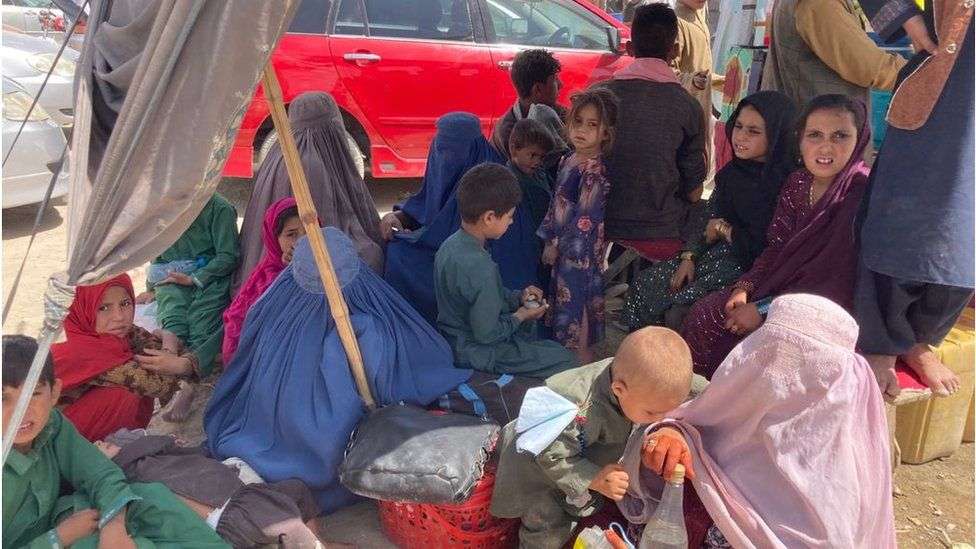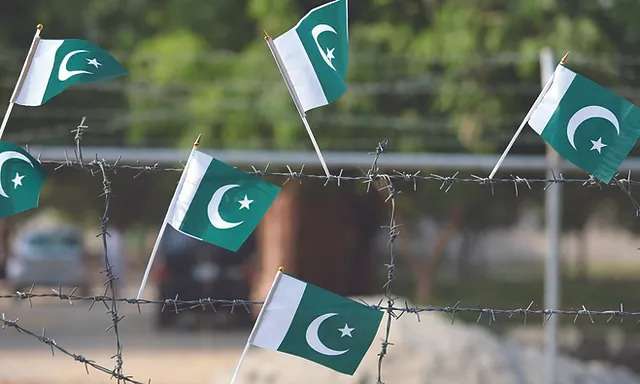Pakistan continues to face challenges to its physical and human security from international, regional, and local environments. Some of these are the result of intolerance, extremism, militancy, and terrorism in both rural and urban areas, while others are the outcome of our history of ties with regional and extra-regional powers. Ethnicity, sectarianism, and economic instability are factors involved in the breakdown of Pakistan’s internal security, these coincide with poor governance, political instability, and grievances among provinces, as well as economic disparity and illiteracy, all of which have negatively affected Pakistan’s security fabric. Although Pakistan launched several military operations and succeeded in eliminating terrorist networks, a few terrorist outfits went to Afghanistan and other neighbouring countries, operating and executing sporadic terrorist activities in Pakistan; they were aided by religious and nationalist banned militants. Since the August 2021 Taliban takeover of Afghanistan, terror attacks increased by 52% in Pakistan; in fact the Taliban’s return to power has had a rejuvenating impact on Pakistani militant groups, particularly the Tehreek-e-Taliban Pakistan (TTP). According to the UN Sanction Committee on Al Qaida and the Islamic State in Iraq and the Levant report, the TTP today enjoys greater operational freedom in Afghanistan under the Taliban regime.
International experiences have shown that the main benefit of elected Local Bodies is their closeness to citizens, which allows them to be much more responsive – although with sustained hard work — to improving local services such as waste, water, sewerage and transportation. However, in the recently held LB elections in Karachi the Jamat Islami (JI) announced a nationwide series of protests and rallies against what it alleged was tampering with Karachi’s results claiming it has secured the biggest number of seats and appealed for a recount in 10 seats . A Mayor is yet to be appointed.
It is unfortunate that Pakistan’s current soaring political tension appears to be an opportunistic struggle for power and has left the country a political tinderbox. And in all of it, little regard is displayed by all concerned for the ongoing suffering of ordinary Pakistanis, who continue to pay the price for the country’s long history of political instability. My article titled “Pakistan’s Security Challenges” is being reproduced below for the benefit of readers:
“While India’s constant threat to the existence of Pakistan has not diminished, for the time being it has become relatively passive given that they are quite busy coping with multiple threats of different and diverse nature within their own country, Afghanistan has recently become a real time security problem. Afghan border forces have repeatedly attacked Pakistan at the major border crossings, a number of Pakistani security personnel have been killed. Their closing for days and weeks has made the situation unsafe for travellers and undermined both present and future trade. Consequently, multiplying of TTP attacks across Pakistan have cost many lives. Our counter TTP terrorism efforts have been hampered by their using safe havens in Afghanistan despite the Afghan Taliban pledging to avoid this in the Doha agreement.
Given the understandings of the Doha agreement with the US withdrawal from Afghanistan in summer 2021, albeit a little hastily, there was a hope that a new generation of Taliban was ready to adjust to modern times. That hope has been sadly gutted! Terrorism will again destabilize Pakistan, already damaged beyond tolerance. Over 65000 civilians had sacrificed their lives till 2018 including more than 9000 security personnel dead. Over 100000 civilians have been injured, nearly 25000 soldiers seriously for these thankless Afghans. The cumulative economic impact of war over the last forty years as normal economic and trade activities got disrupted or became more expensive resulted in lower growth rate in all major sectors of economy. Pakistani business lost its share in exports due to disruption in business cycles and supply line disruption. According to an estimate for the FY 2013-4 and 2014-5 the financial loss of Pakistan amounted to US$ 11.2 billion, for the aggregated period 2001 to 2015 the estimated loss was US$ 107 billion according to the Ministry of Finance of Pakistan. Arab News reported economic losses of $150 billion in the past 20 years by allying with the US as a frontline state in the wake of the Sept. 11, 2001 attacks. The accumulated loss to Pakistan amounts to approximately US$ 125 billion.

Pakistan gave refuge (and continues giving refuge) to millions of Afghans, allowing them not only to stay but also do business, this upset the Pakistani economy in no small way. Like Iran we should have contained them within 5 miles of the Border. Karachi is the second largest Afghan city after Kabul, increasing ethnic strife had made hundreds and thousands of Pakistanis jobless. Caring for the wounded in our hospitals, Pakistan allowed the Taliban elite and their families a safe haven in Peshawar and Quetta. For this Pakistan faced decades of western approbation – and with suspicion about our intentions, we had credibility problem as to where our sympathy lay. Because the Pakistani Taliban continued to receive support from the Afghans, a wave of extremist ideology and terrorism swept our country. Why did we turn a blind eye to those who allowed this calumny to be visited on our country? They should be held accountable! It took years of intense efforts and sacrifice by the Pakistan Army and other security forces to corner and curb extremism and terrorism. The TTP’s recent declaring war on Pakistan shows it is not yet done.
Like the puppet Ashraf Ghani that the US put in place, the Afghan Taliban are also not able to rule their country. Many members of the present Afghan regime have lived in Pakistan for years, yet they do not feel any intent to fulfil their obligations arising from the Doha agreement. Pakistan has to take matters into its own hands, has this been decided in the recent meeting of the National Security Council (NSC)? Cross-border attacks to take their bases out should be an option if nothing else helps. We cannot wait for our security and the lives of our people to deteriorate any more. Finally, hopefully the Sharifs have understood that one cannot successfully talk to TTP and that the only way to deal with them is to take them out. The politicians cannot continue to depend upon this silent support in every constituency to take them to power, the Taliban have longer ranging plans which are contrary to our ideology.
Internal security is endangered not only by terrorists and their attacks. The deteriorating economic situation has robbed a substantial part of the population of their means of living. Rising prices especially in the food sector leave many hungry, not being able to afford a square meal a day. The result is growing political instability and diminishing trust of the citizens in the govt. The constitutionally required third tier of government. Without getting into the politics of General Elections, we must have functioning LOCAL BODIES. Local Bodies must be elected immediately. At the ground level of social relations, a functioning local government can reorganise and solve multiple problems such as municipal services, implementing regulation of local markets, equitable distribution of resources) before they are getting out of hand and become a provincial or national headache. Moreover with participation of the stakeholders out at grassroots level it would be almost impossible for terrorists to have safe houses, a key ingredient of terrorist activity. While our intelligence agencies have done is reasonable job, their intelligence disseminated is neither coordinated nor real-time, with the help of the local populace additional eyes and eyes on the ground would immediately report any unusual activity far more than the source reports or the visits of agents of our intelligence agencies visiting the localities. Local Bodies will also help keep market prices of essentials in check, we have a surplus of almost all edibles except cooking oil, why can’t buffer stocks be maintained to ensure that prices from farms to market do not register an inordinate rise due to middleman and hoarders taking exorbitant profits? Functioning local governments would bridge the gap between provincial and national govt that are far removed them and have a distant perspective where many problems seem inconsequential. Looking at the delay and excuses the rulers bring despite the demand for Local Bodies Elections by the courts we can see that the ruling elite of Pakistan obviously do not want this. In their minds it upsets their political calculus of how to manipulate the forthcoming national elections and their inability or unwillingness to put Pakistan first. Incidentally a key provision for elections to National and Provincial Assemblies should be first being elected to a Local Body. Winning elections is far more important to them than Pakistan’s national interest, as a consequence this further endangers our security. But they forget that real sovereignty of a country is provided only by the internal and external security and well-being of its citizens. I have repeatedly suggested for the last 25 years or so that our soldiers rank and file facing early retirement at an average year of 25 is not correct? Our trained manpower can be better used them by moving them to Rangers and Frontier Corps and Police? This will also avoid the ticking pension bomb we are facing. We must double our Homeland Security and put all para military forces under that one Command like we have done for our nuclear forces by creating the “Special Plans Division” (SPD)?
One more important issue is the formation of a technocratic govt, it is an idea that can be debated. However what is NOT subject to debate is to exclude all those who have been technocrats working with all govts since 2000. They have brought this country into a mess, and we want to give them an opportunity to again play with our existence while lining their own pockets. They have homes in Dubai and/or the US, let them stay there!




